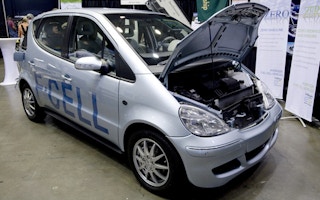Bets against the share prices of fuel-cell manufacturers are climbing as questions emerge about the prospects for profits at some of the Nasdaq’s best performers this year.
Plug Power Inc’s short interest reached a 2 1/2-year high of 10.6 per cent of shares outstanding on March 10, up from 2.4 per cent in September, according to data from Markit Group Ltd., a London-based research group. FuelCell Energy Inc’s short interest was at 14.2 per cent yesterday and Ballard Power Systems Inc was at a record 3 per cent.
Short sellers borrow shares in a company in an attempt to earn profits once the stock declines. FuelCell has doubled since November and Plug is up ninefold as traditional investors recognise fuel cells as a viable alternative to buying electricity from utilities. There’s a growing debate about whether the current valuations are justified.
“It’s a dynamic period in terms of their valuations because it’s hard to identify the potential size of their markets,” said Robert Stone, an analyst at Cowen & Co in Boston, who downgraded FuelCell to hold from buy today after it blew past his $2 price target. “These are emerging technologies with a lot of history that are finally turning the corner to profitability.”
Fuel cells use hydrogen or natural gas to produce electricity through a chemical reaction. The technology has been under development for decades, and the companies involved are starting to report growing commercial sales.
“
Fuel cells use hydrogen or natural gas to produce electricity through a chemical reaction. The technology has been under development for decades, and the companies involved are starting to report growing commercial sales
FuelCell outlook
FuelCell’s stationary fuel cells produce power for factories, hospitals, campuses or utilities. Its annual production rate was 70 megawatts in its first fiscal quarter, up from 56 megawatts a year earlier. That’s closing in on the 80-megawatt benchmark that the Danbury, Connecticut-based company has said would make it profitable.
Executives said yesterday the company will remain at 70 megawatts until demand increases. The shares, which started the year at $1.44, traded as high as $4.74 yesterday and were trading at $3.29 at 1:49 p.m. in New York.
FuelCell’s short interest has climbed from 4 per cent in June and touched 14.9 per cent in December, the most since October 2011, Markit data shows.
Ballard Power’s short interest has surged from 0.2 per cent in October. The hydrogen-fuel-cell maker’s shares finished last year at $1.52 and traded as high as $8.38 yesterday before tumbling to $5.22 today.
Plug power
Plug Power makes fuel-cell systems for forklifts, and Wal-Mart Stores Inc, already a customer, agreed last month to buy more than 1,700 of them for six North American distribution centers. Other large retailers may follow suit, Stone said.
Chief Executive Officer Andrew Marsh said in January he expects to sell more than 3,000 this year. That puts the company on pace to exceed the 750-units-a-quarter rate that would make it profitable. He told CNBC in interview last week that he expect the company will be profitable this year. Plug Power is due to release its earnings tomorrow after the close of trading in New York.
‘Uneven history’
“Plug has had an uneven history and has had quality and liquidity issues,” said Stone, the analyst who has the equivalent of a buy rating on the stock and a $5.50 price target. “They addressed those issues and see a path to profitability in the second half.”
Plug shares plunged yesterday after Andrew Left, an executive editor at Citron Research and a self-described short-seller, said he was skeptical of the company’s forecasts and said in a report that the shares are worth 50 cents.
Left said that Plug’s revenue in 2012 came in at $26.1 million, half the level the company had forecast in May 2012. Plug had revised that outlook in November to a range from $26 million to $30 million.
Left, who said he holds a short position in Plug, declined to discuss Plug’s revised 2012 sales forecast. He said Plug will be threatened if larger companies move into its market, such as Toyota Motor Corp., which plans to release a fuel-cell sedan next year.
“If fuel cells become standard in fork lifts, Toyota is ready to step in,” Left said today in a phone interview. “If hydrogen becomes the fuel of the future then Wal-Mart will take the cheapest supplier.”
Plug dominates the market in fuel cells for material handling and has more than 100 patents that will help protect its advantage should additional suppliers enter the market, said Cowen’s Stone.
“From the cooling fans to compressors and pumps and lithium-ion battery packs, Plug has the drop-in design that works,” Stone said. “It’s taken years to develop and and it’s just one application. They will have more.”










